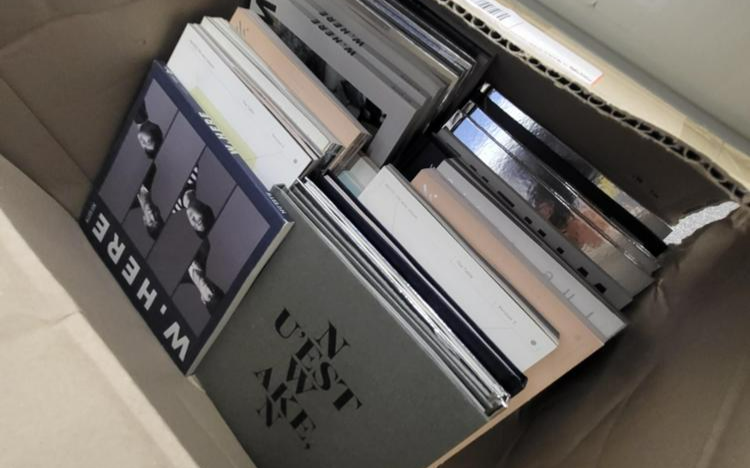
Seen are K-pop albums discarded by Korean fans and collected by global K-pop fandom initiative, Kpop4Planet, March 18, 2022. Courtesy of Kpop4Planet
K-pop fan-led global climate initiative calls for ‘green album option’
By Lee Hae-rin
The amount of plastic used by Korean entertainment companies to manufacture K-pop albums increased by more than 14 times in the last six years, according to an opposition lawmaker, Sunday.
According to documents that Rep. Woo Won-shik of the main opposition Democratic Party of Korea (DPK) obtained from the Ministry of Environment, K-pop entertainment companies used 801.5 tons of plastic last year to make physical albums, including CDs, photo cards and wrapping vinyl, which is a whopping jump of more than 14 times from 55.8 tons in 2017.
The actual amount of plastic used to produce the albums is likely to surpass the ministry’s figure, considering their sales volume.
Over 74.2 million K-pop albums were sold nationwide last year, according to the local sales tracker Circle Chart, suggesting at least 1,395 tons of plastic waste were produced from CDs alone, excluding packaging and other merchandise, as each unit weighs around 18 grams.
A sustainability management report announced by HYBE in July stated that the K-pop powerhouse behind the mega success of BTS used 894.6 tons of plastic from producing and packaging K-pop albums last year.
In accordance with the increasing use of plastic, the companies are paying a growing amount of allotted charges in compensation for their climate change impact, according to Rep. Woo.
Kpop4Planet, the digital climate initiative led by global K-pop fandoms, said the marketing strategies of entertainment companies that take advantage of fan loyalty to maximize profits, have incited the mass production of plastic waste.
“K-pop fans tend to bulk buy from dozens to hundreds of albums upon their release to boost artists’ sales and collect photo cards featuring different members to get higher chances of winning tickets for fan events,” campaigner Park Jin-hui told The Korea Times, Sunday.

Seen are K-pop albums that Korean fans bought in bulk but disposed of, collected by global K-pop fandom initiative Kpop4Planet, March 18, 2022. Over 8,000 physical albums were collected during the campaign. Courtesy of Kpop4Planet
The group launched a global advocacy campaign, “No K-pop on a Dead Planet,” aiming to make K-pop green and sustainable, as a sense of responsibility on climate-change issues have grown among K-pop fans who became aware that most of the albums they buy end up as waste.
According to the Kpop4Planet’s 2021 survey, an overwhelming 95.6 percent of respondents said entertainment companies are responsible for the K-pop industry’s climate actions, when multiple answers were allowed, followed by fandoms and artists, respectively at 59.4 and 39.5 percent.
Based on this survey, the group has been urging companies to offer a “green album option” in album sales, in which fans can choose to pay for as many albums as they wish while only receiving a few physical albums to minimize the excess waste.
With entertainment companies saying they are making a positive green shift by releasing digitally distributed music and merchandise to create less waste, the group’s request remains unanswered.
Meanwhile, the environment ministry has no plans to enforce regulations on entertainment companies to reduce plastic waste or to include music albums on a list of products subject to overpackaging monitoring, according to the lawmaker.
“Considering the global popularity of K-pop, entertainment companies should enhance their ESG management standards and the environment ministry should come up with countermeasures,” Rep. Woo said, in addition to suggesting regulations to require companies to publish notices on albums informing buyers of disposal methods for the products and the establishment of cost sharing measures for waste management.

